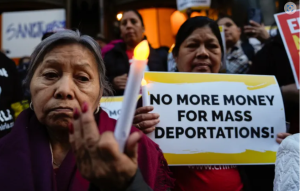A Devastating Blow: Trump Administration Strips Legal Status from 530,000 Immigrants
In a controversial and sweeping move, President Donald Trump has revoked the legal status of over 530,000 immigrants from four Latin American and Caribbean nations — Cuba, Haiti, Nicaragua, and Venezuela — effectively putting them on a fast track to deportation starting April 24, 2025.
The decision, published in the Federal Register, marks one of the most significant rollbacks of humanitarian immigration protections in recent U.S. history.
Biden’s Parole Program Dismantled
The immigrants affected were previously granted humanitarian parole under the CHNV entry program, a pathway introduced by former President Joe Biden in response to rising undocumented migration. Launched in 2022 for Venezuelans and expanded to other nationalities in 2023, the program allowed vetted individuals with U.S.-based sponsors to enter legally and safely by air.
Trump’s administration, however, has declared the program an overreach of federal authority. In a January 20 executive order, Trump announced plans to dismantle the parole entry system, citing national security and immigration control.
Expedited Removal Process Now in Play
The Department of Homeland Security (DHS) confirmed that revoking the parole status clears the path for “expedited removal”, a fast-track deportation process that bypasses lengthy legal proceedings. Many of those affected now face uncertainty, especially those who have not secured alternative legal protections.
The DHS notice warns that “remaining in the country without lawful status” may trigger swift removal under existing immigration enforcement policies.
Legal Challenges and Community Outrage

The decision has sparked immediate backlash from immigration advocates and civil rights organizations. A coalition of immigrants and U.S. citizens has filed a lawsuit seeking to block the move and reinstate the CHNV parole programs.
“Suddenly revoking the lawful status of hundreds of thousands is going to cause needless chaos and heartbreak,” said Karen Tumlin, director of the Justice Action Center.
Nicolette Glazer, a prominent immigration attorney in California, warned that “the chaos will be unreal,” emphasizing that the majority of affected individuals had no backup legal plan in place.
Families in Limbo, Humanitarian Concerns Mount
The revocation leaves hundreds of thousands of families in limbo, many of whom have established roots, found jobs, and contributed to their communities under the assumption of legal protection.
Human rights groups argue that the decision not only breaks faith with immigrants and their sponsors, but also sends a chilling message to vulnerable populations seeking refuge from political and economic crises in their home countries.
Meanwhile, Venezuela has already resumed repatriation flights, signaling the start of a complex and emotional process for thousands of deportees.
What’s Next? Ukrainians Could Be Next in Line
Adding to the tension, Trump recently hinted at the possibility of revoking parole status for 240,000 Ukrainian refugees who arrived during the war with Russia. This raises further alarm over the future of humanitarian immigration policy under his administration.
As Trump doubles down on hardline immigration stances ahead of the 2025 elections, the fate of hundreds of thousands of immigrants now hangs in the balance.
Final Word
Trump revokes legal status for immigrants—and in doing so, he reignites the fiercest immigration debate in recent history. With legal battles underway, political stakes high, and families desperate for clarity, the next chapter of U.S. immigration policy is unfolding in real time.
